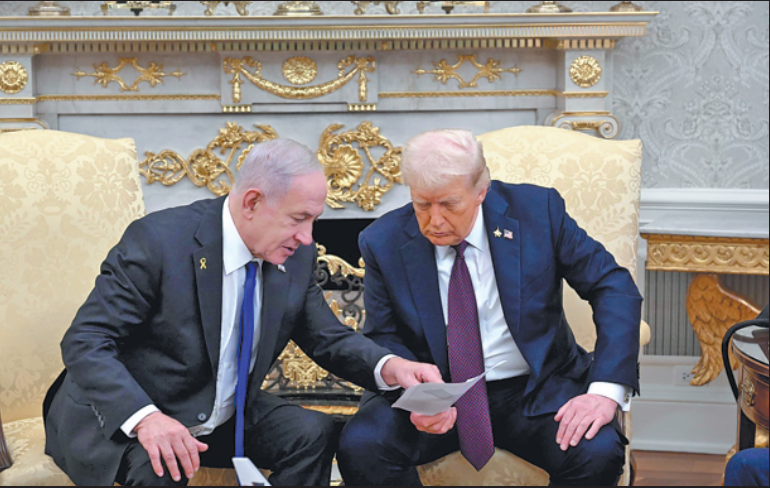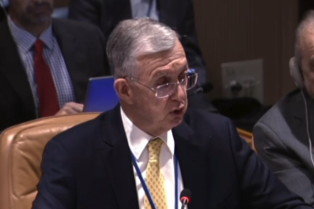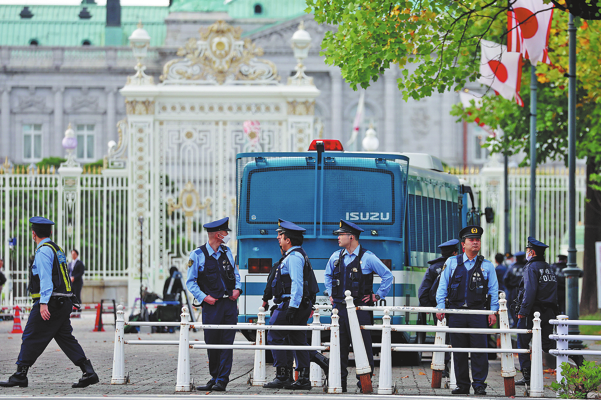Gaza peace plan triggers split reactions
Trump's 20-point proposal backed by Netanyahu as Hamas weighs response






United States President Donald Trump and Israeli Prime Minister Benjamin Netanyahu said on Monday they had agreed on a plan to end the conflict in Gaza, leaning heavily into conditions that Hamas has previously rejected.
Trump's 20-point plan calls for all hostilities to end immediately, a swap of hostages held by Hamas for Palestinian prisoners held by Israel, a staged Israeli troop withdrawal from the Gaza Strip, Hamas disarmament, and a transitional government led by an international body.
Trump would chair an international "board of peace" to govern and reconstruct the Gaza Strip as part of the plan, which does not require residents to leave the territory.
Speaking at a joint news conference with Netanyahu, Trump said it is time for Hamas to accept the peace proposal.
Hamas said on Tuesday it will discuss the peace plan within the group and with other Palestinian factions before responding.
Trump said on Tuesday that Hamas has about three or four days to respond to his Gaza peace plan proposal or face the consequences.
Global reaction was swift. Eight Arab and Islamic countries, including Egypt, Qatar and Indonesia, welcomed the plan, reaffirming their commitment to working with the US to secure a deal that guarantees unrestricted humanitarian aid to Gaza, the release of hostages, security for all sides, complete Israeli withdrawal, reconstruction of Gaza, and a path toward a just two-state solution.
The Palestinian Authority, based in the West Bank, expressed readiness to work with the US and partners to end the Gaza conflict through a comprehensive agreement, Palestinian news agency WAFA reported.
Islamic Jihad, a Palestinian militant group fighting alongside Hamas in Gaza, slammed the peace proposal as "a formula for igniting the region".
Questions raised
In devastated Gaza, meanwhile, residents expressed skepticism that the plan could end their sufferings. "We as a people will not accept this farce," said Abu Mazen Nassar, 52.
"They want to impose their own peace," Umm Mohammed, a history teacher who sheltered with her family in Gaza City, told The Associated Press. "In fact, this is not a peace plan. It's a surrender plan. It returns us to times of colonialism."
Phyllis Bennis, a fellow at the Institute for Policy Studies in Washington, said Trump's plan lacks protection for Palestinians. "There are no guarantees to protect Palestinian interests. There are no guarantees that the war will come to a permanent end ... This is really a scenario that does not promise an end to the war, does promise a long-term occupation by foreign troops," she said.
In a video statement published on Telegram early on Tuesday, Netanyahu said the Israeli military "will remain in most of the Gaza Strip".
In another development, Netanyahu expressed regret for an Israeli attack in Doha to Qatar's leader on Monday in a three-way call with Trump, the White House said.
Netanyahu also expressed regret for Israel violating Qatari sovereignty and "affirmed that Israel will not conduct such an attack again in the future", the White House added.
At a United Nations Security Council meeting on the situation in the Middle East, including the Palestinian question, on Monday, Fu Cong, China's permanent representative to the UN, said "the country with special influence on Israel" must assume its corresponding responsibilities in earnest.
Fu did not name the country.
"We must take robust action to de-escalate tensions in the West Bank," Fu said. "We must act with utmost urgency to end the conflict in Gaza."
He also called for efforts to revitalize the two-state solution with a firm resolve.
"China reiterates that attacking civilians and civilian infrastructure is unacceptable, weaponizing humanitarian supplies is unacceptable, and violating international law and international humanitarian law is equally unacceptable," Fu said.
"Together with the international community, China stands ready to push for an immediate end to the fighting in Gaza, alleviate the humanitarian catastrophe, implement the two-state solution, and advance a comprehensive, just, and lasting solution to the question of Palestine, to make greater contributions to the peace and stability in the Middle East."
As the humanitarian crisis in Gaza worsens, pluralities of US citizens — including self-described Democrats and Independents — think the US is providing Israel with too much support and military aid in its offensive, according to a report on the 2025 Chicago Council Survey released on Sept 18.
The poll, conducted in July, found that 53 percent of Democrats consider the US supports Israel too much, upped by 13 percentage points from last year. In contrast, more Republicans now believe that the US strikes the right balance in its support (47 percent, up from 23 percent).
Yang Yilin in Beijing and agencies contributed to this story.
Contact the writers at huanxinzhao@chinadailyusa.com





























